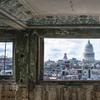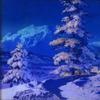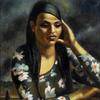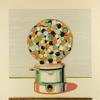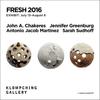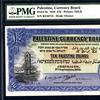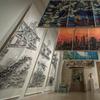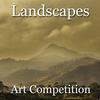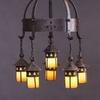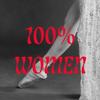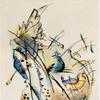Rubell Museum Reveals Its Inaugural Installation for New Campus in Miami
- MIAMI, Florida
- /
- September 30, 2019
The Rubell family has been pioneering collectors of contemporary art for over 50 years - now a new 100,000 square-foot museum will offer visitors a journey through 5 decades of art in their unparalleled collection.
The Rubell Family Collection has changed its name to Rubell Museum.
The Rubell Museum has announced that its new campus in Miami will open on December 4, 2019 with a museum-wide installation of works that chronicle key artists, moments, and movements in vital arts centers over the past 50 years, from the East Village to Beijing, Los Angeles to Leipzig, and São Paulo to Tokyo.
The inaugural exhibition encompasses more than 300 works by 100 artists, providing one of the most far-ranging museum exhibitions of contemporary art ever presented. Drawn entirely from their expansive collection of over 7,200 works by more than 1,000 artists, the exhibition features defining and seminal works by artists whom the Rubells championed as they were first emerging (often becoming the first collectors to acquire their work) and those who had been overlooked. The new Rubell Museum is located in the Allapattah neighborhood of Miami, less than a mile from its original home in Wynwood. The new space is closer to downtown and readily accessible via public transportation.
Retracing the Rubells’ journeys to both major and emerging art centers around the world, the inaugural exhibition includes surveys of artists working in proximity to one another and deep dives into individual careers, tracing influences and revealing parallels among contemporaries and across generations. Installed within the museum’s 40 galleries and its public spaces, highlights from the installation include:
• Works acquired by the Rubells very early in artists’ careers, including Cindy Sherman’s Untitled Film Still (#21) (1978); Jeff Koons’ New Hoover Convertible (1980); Keith Haring’s Statue of Liberty (1982); David Wojnarowicz’s Chicken Legs (1983); George Condo’s K-9 Explosion (1986); Rosemarie Trockel’s Untitled (1986); Richard Prince’s Untitled (cowboy) (1987); Cady Noland’s This Piece Has No Title (1989); David Hammons’ Esquire (or John Henry) (1990); Elizabeth Peyton’s Burkhard Riemschneider (1995); and Kerry James Marshall’s Untitled (1998-1999).
• American painters whose work is included in the Rubells’ traveling exhibition 30 Americans, opening at the Barnes Foundation on October 27, including Nina Chanel Abney, Rashid Johnson, Henry Taylor, Hank Willis Thomas, Mickalene Thomas, Carrie Mae Weems, Kehinde Wiley, and Purvis Young.
• A survey of German artists, with works by Isa Genzken, Anselm Kiefer, Neo Rauch, and Paloma Varga Weisz.
• Works commissioned by the Rubells from their artist-in-residence program, including Jonathan Lyndon Chase, Lucy Dodd, Cy Gavin, Sonia Gomes, Oscar Murillo, Sterling Ruby, and Allison Zuckerman.
• Extensive installations of contemporary Los Angeles artists, featuring works from the 1980s and early 1990s by such artists as John Baldessari, Mike Kelley, Barbara Kruger, Paul McCarthy, Catherine Opie, Charles Ray, and Kaari Upson.
• Three immersive installations by Yayoi Kusama, including Where the Lights in My Heart Go (2016), INFINITY MIRRORED ROOM – LET’S SURVIVE FOREVER (2017), and Narcissus Garden (1966–present).
• Five galleries dedicated to New York appropriation artists of the early 1980s, including works by Peter Halley, Jenny Holzer, Louise Lawler, Robert Longo, David Salle, Philip Taaffe, Meyer Vaisman, and Christopher Wool.
• A selection of works from the 100 studio visits the Rubells made in China between 2001 and 2012 by artists such as Ai Weiwei, Qiu Zhijie, and Zhu Jinshi.
“For more than 50 years we have been on an incredible mission: searching for new art and art that has been overlooked. Now, with the opening of the new Rubell Museum, we will be able to share the remarkable range of art we fell in love with along the way,” stated Mera Rubell. “Rather than presenting a single narrative or survey, we wanted to let the many voices that contribute to contemporary art speak for themselves and with each other. In retracing our steps, we hope visitors will discover, as we did, that creativity thrives where artists energize each other’s practices, and wrestle with shared issues and artmaking in new ways.”
The Rubells created their collection by looking at art, talking with artists, and trusting their instincts. They started collecting 54 years ago when Don was in medical school and Mera was teaching at Head Start, and continue to follow the same practice today, now with their son Jason. They acquired their first work after a studio visit and were only able to do so by paying on a modest weekly installment plan.
The Rubells’ collection provides an unprecedented roaming range that has enabled them to organize 48 exhibitions drawn entirely from the paintings, sculptures, photographs, videos, and installations of which it is comprised. These have included such groundbreaking and diverse exhibitions as Life After Death: New Leipzig Paintings (2004), Red Eye: Los Angeles Artists (2006), 30 Americans (2008), Keith Haring: Against All Odds (2008), and NO MAN’S LAND (2015). Many of these exhibitions have toured to museums internationally and been accompanied by major catalogues, published in-house, including 30 Americans, which has toured for ten years and will open at the Barnes Foundation in Philadelphia on October 27, 2019. The Rubell Museum has also lent works to hundreds of museums around the world.
The Rubell Museum is housed in six former industrial buildings that have been connected and transformed by Selldorf Architects. Eighty percent of the 100,000-square-foot campus will be open to the public and includes 53,000 square feet of gallery space, flexible performance space, an extensive art research library, a bookstore, and an indoor-outdoor restaurant that opens onto a courtyard garden. Designed by La Casona Garden in collaboration with Juan Roselione-Valadez, the garden was conceived of as a restoration project using plants, many now rare and threatened due to habitat loss, native to the Everglades and the Florida Keys. The garden, with its birds and butterflies, creates a welcoming entry to the Museum.


